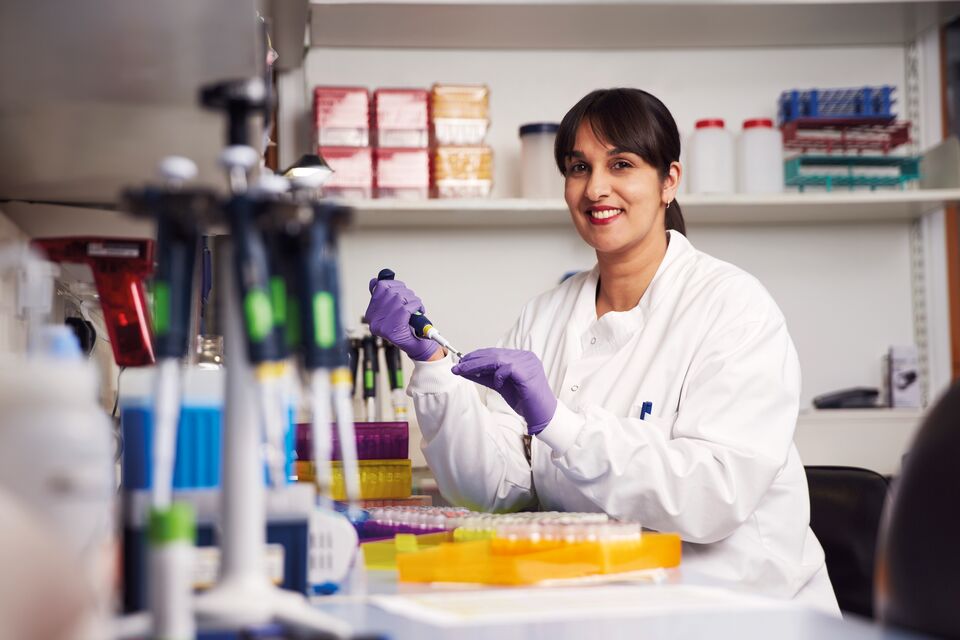We use HLA typing for disease association, pharmacogenetics, and to support transplantation. We can also provide bespoke HLA typing upon request.
HLA typing is used to match patients and donors for transplantation. It is also helpful for researchers working in areas of preclinical research, such as immunotherapy.
While understanding of the importance of HLA is growing, the actual process of HLA typing is complex and needs to be performed by highly competent and skilled specialists. Many hospitals and researchers in academia and industry therefore opt to outsource HLA typing to expert laboratories, such as Anthony Nolan.
Why is HLA typing helpful?
HLA typing can be used to help diagnose some conditions, and predict how someone may react to certain types of medicines, for example:
- Disease association: There are certain HLA alleles which are linked to immune conditions like coeliac disease and ankylosing spondylitis, so HLA typing can be used to help with their diagnosis.
- Pharmacogenetics: A person’s HLA alleles can influence how they respond to medications. For example, people who are HIV-positive are sometimes treated with a specific drug. But it’s long been known that this drug causes severe side-effects in those who carry the HLA-B*57:01 allele. Testing for this particular allele therefore helps with clinical decision making.
Scientific understanding of the influence of HLA in medicine is growing all the time, and Anthony Nolan’s work is central to much of the pioneering research that’s happening in the sector.
Why partner with Anthony Nolan CT&LS?
Across the world, more than 40,000 different HLA alleles have already been identified, and new ones are being discovered all the time. The HLA research community is built on international collaboration between labs worldwide, so whenever a potential new HLA allele is discovered, the DNA sequence is submitted to one central database (the IPD-IMGT/HLA database).
This critical database, containing sequences of all the HLA alleles that have ever been found, is maintained by Anthony Nolan’s Bioinformatics team. So, if you need an HLA typing service, it makes sense to come to the industry leader: Contact Us now, for further information.
Our HLA typing services
HLA typing can be used for many applications, including but not limited to:
- Supporting patient/donor transplantation
- Anti-HLA antibody screening and identification
- Disease diagnosis, for conditions such as coeliac, ankylosing spondylitis and narcolepsy
- Pharmacogenetics and other hypersensitivity reactions
- Genetic mutation testing, e.g., HFE (Haemochromatosis risk) and CCR5 (HIV resistance) mutations
- At Anthony Nolan, we perform genotyping of the following HLA genes: HLA-A, HLA-B, HLA-C, HLA-DRB1, HLA-DRB3, HLA-DRB4, HLA-DRB5, HLA-DQA1, HLA-DQB1, HLA-DPA1, HLA-DPB1
We can also report HLA typing data in a variety of different formats to suit your needs, and are happy to help interpret your results if required.
Many of our clients choose to outsource their HLA typing requirements to Anthony Nolan CT&LS, safe in the knowledge that we’re leaders in our field.
Our typing and development team
This team performs HLA typing on donor, patient and commercial samples using Next Generation Sequencing (NGS). Our specialist sequencers enable us to achieve high to allelic level typing on up to 11 loci, ensuring each patient can be matched with the most suitable donor available.
The team is also equipped to:
- use Sequence Specific Primers (PCR-SSP) for various applications, including the rapid detection of disease-associated alleles
- perform non-HLA gene testing, which can be used to identify inherited conditions and genetic mutations
- confirm blood ABO grouping and sex determination
- handle high-throughput screening
- turn-around urgent requests within 24 hours if required
Want to know more?
Fill out our contact us form, and we’ll aim to get back to you within one working day to discuss.

